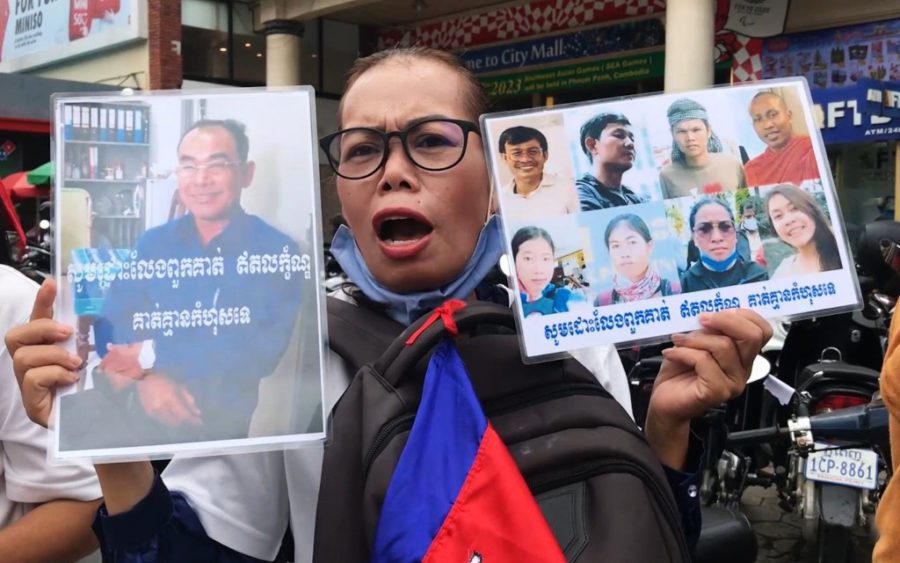Opposition members on trial at the Phnom Penh Municipal Court on Friday complained of being arrested at gunpoint without explanation; a private call and messages used as evidence for inciting social insecurity; being threatened to attest to their testimony; and their supposed testimony containing words they did not say.
The court questioned six members of the banned CNRP in a case in which CNRP co-founder Sam Rainsy, party vice-presidents Eng Chhay Eang and Mu Sochua, all of whom live abroad, as well as 18 other party members are accused of conspiracy, incitement to commit a felony or disturb social security, and inciting military personnel to disobedience.
Friday’s hearing was part of ongoing mass trials — which critics have called a “show” — against the outlawed opposition over leaders’ statements and members’ activism since the party was dissolved in 2017.
Defense lawyer Sam Sokonng said the main facts of the case related to the formation of a CNRP “movement” overseas despite the party being banned, as well as comments about Covid-19 and Rainsy’s plan to return from exile in 2019.
During questioning, Khut Chroek, a former CNRP executive council member in Prey Veng province’s Preah Sdach district, told Sokong that he was arrested without being told the reason, and that the court did not inform him about his right to have a lawyer.
Deputy prosecutor Seng Heang questioned Chroek about his comments on Facebook that the Health Ministry lacked the ability to detect Covid-19. Chroek said he did not know his statements had an impact.
His words about Covid-19 were made in private messages but not posted in public, he said.
Another defendant, Sok Chantha, denied the judicial police’s accusations against him, saying he was not allowed to hear the voice recording of his allegedly criminal statement.
Heang, the deputy prosecutor, pressed him over his testimonies. “You also thumb-printed all the answers,” Heang said.
“I thumb-printed because I was scared. I was always intimidated,” Chantha said.
Talking through tears, the defendant said he had been invited to the commune office and arrested without explanation. He said police forced him to give answers.
“They told me that we are Khmer, the same, and just follow him and [I] will be back home soon,” he said.
Nhaem Van also denied his previous testimony, which he said had been written down differently from his actual words. He said he had thumb-printed the document because he was threatened.
“If I didn’t thumb-print, they said be careful for my family. I felt scared and I thumb-printed it,” Van said.
The accused said he had phoned his wife and told her to be careful about Covid-19 in a call in which he also blamed Prime Minister Hun Sen for allowing too many Chinese people into the country.
He did not accept the written transcript of the call used as evidence against him, and had not been allowed to listen to a recording to verify it, he said.
Van added that he had been arrested in Poipet city without being told the reason. “They pointed a gun at my head,” he said.
Khim Pheana, a former commune councilor in Phnom Penh, also told the court that he had called his wife and informed her to be careful about Covid-19, but he had not insulted the country’s leaders. He also denied his presented testimony, saying that some words were added and that he was intimidated while police questioned him.
Pheana added that he had made a private phone call — not posted publicly on Facebook.
Two other defendants refused to answer questions. Thay Kunthea said he accepted his testimony and had nothing to add, while Yim Sareth said he was sick and couldn’t remember anything.
According to his wife, after his arrest last year, police showed Sareth a Facebook post he had made about Covid-19.
“I am wearing this mask because I don’t want to inhale dust and cement, especially Covid-19,” the post said alongside a photo.
On Friday, Judge Ros Piseth said judicial police and investigating judges had fulfilled their work with professionalism.
National Police spokesman Chhay Kim Khoeun said by phone that if any of the accused are not satisfied with the police handling of the case, they can file a complaint.
“I have nothing to explain,” he said. “Let the prosecutor investigate the activities of the judicial police.”
The judge said the trial will continue on February 4.
Additional reporting by Khan Leakhena












